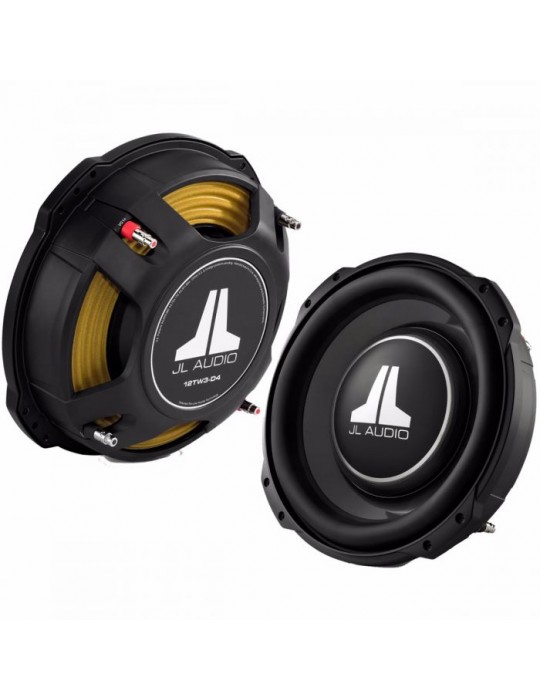JL Audio 12" TW3 Subwoofer
12TW3-D4
12-inch (300 mm) Subwoofer Driver, Dual 4 Ω

Installations backed by our Lifetime Labor Warranty
Building on the core technology of our TW5 thin-line subwoofers, the TW3’s deliver a powerful combination of shallow mounting depth and excursion capability. In fact, they are capable of greater excursion than the W3v3’s.
To allow this remarkable feat to be achieved, JL Audio’s patented thin-line woofer technology compresses the architecture of the TW3’s using a “concentric tube” structure built into the injection-molded cone body. This structure supports the voice coil and a full annular spider, while permitting the placement of the large motor structure further forward in the speaker than with conventional designs.
TW3’s are optimized for small enclosures and offer our tab-ear mounting design to maximize cone area within their mounting footprints. We know you’re going to love working with these amazing Subwoofers.
Deep, powerful and accurate JL Audio bass is now possible in more applications than ever.
- Very shallow mounting depth (3.25 / 3.50 Inches)
- No pole vent: permits mounting close to rear wall of enclosure.
- Very small sealed enclosure volume requirements
- Very long linear excursion capability (0.60 In / 15.2 mm, one-way)
- DMA-optimized motor designs
- “concentric tube” architecture
- Patented “floating cone attach method” technology
- Cast alloy frame
- Injection molded, mica-filled polypropylene cone
- Rubber surround
- Aluminum-alloy dust cap and rear cap with JL Audio logo
- Precision-built in USA at JL Audio’s Miramar, Florida factory with global components
| Free Air Resonance (Fs) | 26.46 Hz |
| Electrical “Q” (Qes) | 0.558 |
| Mechanical “Q” (Qms) | 10.766 |
| Total Speaker “Q” (Qts) | 0.531 |
| Equivalent Compliance (Vas) | 1.72 cu ft / 48.73 L |
| One-Way Linear Excursion (Xmax)* | 0.6 in / 15.2 mm |
| Reference Efficiency (no) | |
| Efficiency (1 W / 1 m)** | 84.11 dB SPL |
| Effective Piston Area (Sd) | 83.517 sq in / 0.0539 sq m |
| DC Resistance (Re)*** | 9.280 Ω |
|
* Xmax specifications are derived via one-way voice coil overhang method with no correction factors applied. |
|



